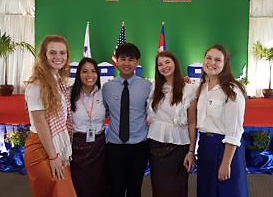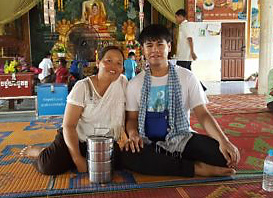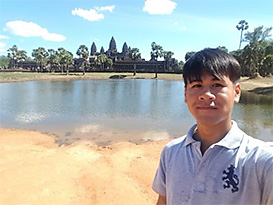Talking with Romany Tin (Cambodia)
The Peace Corps may do work around the world to reduce HIV stigma and discrimination, but, according to a report on Friday, it’s a different story if one of its volunteers tests positive.
A Peace Corps volunteer who was stationed in Cambodia claims the federal government agency quarantined him in a hotel room and then terminated his service after he tested positive for HIV. Wrote Jorge Rivas in Splinter News
I published the article “Peace Corps accused of quarantining, then firing, PCV with HIV (Cambodia)” about PCV Romany Tin on March 12 on our site and then reached out to get his story of what happened in Cambodia and with the Peace Corps. — JCoyne
•
First off, Romany, where did you go to college?
I attending California State University Long Beach and majored in Political Science and International Studies. I graduated in May of 2017 and departed to Peace Corps on July of 2017.
Why that decision?
I decided to go into Peace Corps for several reasons. I learned a lot about development in my International development class and grassroots bottom-up I believe are the key to sustainable development. Seeing what Peace Corps do made me want to join Peace Corps. I was also interested in gaining valuable experience for work and personal growth. Another selfish reason was that I wasn’t ready to start adult life or graduate school, thus Peace Corps served as a hold for the time being. However, after joining Peace Corps, I learned much more than what I expected. I had the opportunity to change the lives around me and learned that a small change can really make a difference. I had the best times of my life, made great connections with people I never thought I would, and see things through a difference lens. Even though I did obtain my illness during my service, I do not regret the decision at all.
What was your assignment?
I applied to Peace Corps around October of 2016 and was invited to service in Georgia on April of 2017. Without hesitation, I accepted the offer and was very excited to serve in a country I didn’t know about. While I was originally supposed to graduate in December of 2016, things took an unexpected turn where I had to delay my graduation date for an extra semester. I was no longer able to make the departure date for Georgia, so I asked if I could be considered for another country departing in a later date because I really wanted to do Peace Corps. They agreed and offered me an invitation to serve in Cambodia on July of 2017. I was shocked and very surprised that they offered me this invitation knowing that my parents background are Cambodians. Without hesitation again, I accepted the offer and was even more excited to serve in a country where my parents are from. Growing up, I was Americanized and barely participated in Cambodian culture activities from my parents. I took this opportunity to learn development strategies and connect with my parents by surrounding myself with the culture.

At the swear-in ceremony with other K-11 Peace Corps/Cambodia Volunteers
You wanted to go to Cambodia?
I was invited to Cambodia to serve in the education sector. As stated on the Peace Corps website for Cambodia, my main project was to co-teach with Cambodian national teachers to build technical classroom skills, help design lesson plans, and introduce effective classroom management techniques. By doing these, it improves the Cambodian national teachers teaching by them learning new teaching methodologies and creating more student-orientated lessons. I also had the opportunity to create side projects as well. Using tools to determine what the community desires, I discussed with my counterparts to develop which projects we could do. Unfortunately, I wasn’t able to start them because I was sent back to the United States for contracting HIV. My original close of service date was October of 2019, but I was sent back only after 7 months.
When did the HIV issue emerge as a problem?
I don’t understand this question because HIV did not emerge as a problem. Having HIV did not affect my work that I was doing there. When I was diagnosed with it in mid-January, this is when the problem started when I was sent back to Washington DC to start treatment. Even after successfully being treated and being on medication, I was not allowed to go back into service because what Peace Corps states as a health concern for me. I am very disappointed that Peace Corps send volunteers to work in the health sector to educate on HIV prevention and stigma, yet has their own misunderstanding on it. I am perfectly healthy and ready to go back to serve in the community that I have left.
How long were you in-country?
I was a volunteer in country for 7 months and sworn in for 5 months until I realized I was diagnosed with HIV.
You did not have HIV going into the Peace Corps.
I was negative prior to my departure date and was medically cleared for service.
In Washington at Peace Corps/HQ what did they say about your returning to Cambodia?
The Peace Corps told me that I wasn’t able to return back to Cambodia even after I would be medically treated because Cambodia cannot accommodate my medical needs. They told me that there are a few number countries where HIV volunteers can serve and Cambodia isn’t one of them. I was also not given an option to transfer my service either. After hearing this news, I went out to do my own research. I wanted to understand what they meant by my medical needs because a person with HIV doesn’t require much treatment except for medication and a routinely blood work every 3-6 months. After looking further, I came to realize that Cambodia can indeed provide both of these, yet was rejected to return to service even though I was successfully treated and am perfectly healthy with nothing affecting how I would work. It’s very disappointing to see how progressive Peace Corps is and how they send health volunteers for HIV education and stigma reduction, but their policy on HIV is backwards and the lack of understanding of treatment for individuals with HIV.

At the local temple with my host mother
What are you doing about getting back into the Peace Corps…anything?
Right now, I am continuing to work with the ACLU and Lambda legal to overturn this decision to allow me to return to service. Ultimately, I would like other volunteers who contract HIV to be able to continue their service if they wish to do so and for Peace Corps to stop discriminating against volunteers with HIV. I would like to remind everyone about the 2008 case with Jeremiah Johnson against Peace Corps. Peace Corps committed themselves to stop terminating volunteers who contract HIV and to provide reasonable accommodation, but here is history again repeating itself.
Romany, can you remind us what the 2008 case with Jeremiah Johnson was all about?
In 2008, Jeremiah Johnson, a Volunteer who was serving in Ukraine, was kicked out of Peace Corps for contracting HIV during his service. Under wrongful termination, Jeremiah Johnson fought against Peace Corps with the ACLU wanting to return to finish his service in Ukraine. With medical treatment for HIV, serving in a country with medication should no longer be a problem. After successfully winning the case, Peace Corps committed to not automatically terminate Volunteers who contract HIV during their service, but to make individual assessments and provide reasonable accommodation. As you can see with my case, Peace Corps did not make individual assessments nor did they provide me with reasonable accommodation, and I was automatically terminated after my days of medical separation were up.
What are you doing now while you fight your case with the agency?
I am keeping on contact with the ACLU and also Jeremiah Johnson to further push this case. I also contacted my congressman and senate to have them in the loop on this case as well. More importantly, I am keeping myself healthy and surrounding myself with positive energy.

At Angkor Wat, the biggest religious monument in Cambodia
Thanks for your time on this, Romany. It is something that all RPCVs (and PCVs) should know about.
Something that I want everyone to know and not just RPCVs or PCVs is that HIV is not the same as it used to be 30 years ago. There has been medical advancements for treatment over the decades. One ignorant myth that I keep hearing is that I would be a risk to people around me. I cannot transmit anything as long as I am on medication. DO NOT VIEW US ANY DIFFERENT, we are the same people! The likely hood of me getting sick is the same with everyone else. This stigma behind HIV and many other chronic illnesses need to stop. Education is needed everywhere.
I’m not sure that it is exactly accurate that being on meds for a relatively short time (with an undetectable viral load) is a guarantee of non-transmission. http://www.aidsmap.com/Viral-load-and-transmission-a-factsheet-for-people-with-HIV/page/1044617/. I agree with Romany that education about the state of HIV is in order. I watched some friends die and some friends live long with good treatment.
It is true that the stigma of HIV is still with us, and it may be that in some countries being positive would be a real problem for PCVs socially if blood work is necessary every three months. We all know that there are no secrets in places where Volunteers commonly serve. We (my site-mate and I) couldn’t sneeze in our village in rural India without everyone wondering if we were on death’s doorstep.
In my view, and from only the information here, Peace Corps failed when they did not find Romany another post where HIV was not a cultural problem.
Romany Tim, I think you showed real courage coming forth with your story and I wish you well.
Thank you, John, for publishing the interview.
Peace Corps Volunteers are not civil service employees and do not enjoy all the protections of those employees. Volunteers still serve at the “pleasure of the President”, that authority is delegated down through the administrative chain of command. This gives Peace Corps staff a lot of discretion. Volunteers are protected by civil rights legislation. Still, I advocate for contracts for Volunteers with both rights and responsibilities spelled out.
I really had to think about whether I wanted to comment on this issue. Clearly, today is a long way from the PC of the early/middle ’60s. Regardless of theories about disease transmissability, and what appears a sexually active PCV carrying a potentially fatal infection, and potentially infecting host country individuals who cannot afford lifetime medication and care, and therefore assigned to an early death, I can only imagine what political forces hostile to America, and hostile to the PC, could do with this. As a former executive, I think I have to come down on the side of the PC officialdom on this one.
It reminds me of how cautious, prudent, and even priggish most of us PCVs were back in the early days. I still remember the few instances of PCVs engaging in intimate relationships with locals, and in one instance, heedlessly crossing over a locally- understood line, could have resulted in somebody being summarily killed. It required some serious talking and reasoning to avoid the consequences.
I have to stand with the PC officialdom on this one. John Turnbull Ghana-3 Geology and Nyasaland/Malawi-2 Geology Assignment, 1963, -64, -65,
I too was a Peace Corps volunteer who was infected with HIV. My situation was quite different. I had about a month to complete my service when I found out my diagnosis. It was a telephone call while I was teaching that the news came. I was taken aback by the results considering that I used condoms, and also upset that I couldn’t be told during an office visit or at a more appropriate time. To make matters worse, the person I contracted it from (who was not from my host country) transmitted it intentionally via receptive oral sex. I was greeted by a message from the person that simply read, “I got you.” ..and I was verbally abused by the person who later said I wouldn’t amount to anything, that I was poor, and would end up working at Wal-Mart. I was not flown to Washington DC, but I was told to call a number once I returned home to the US. After identifying two medical facilities that were supposed to treat me for my diagnosis, I eventually found out that the institutions wouldn’t take the insurance/worker’s comp. This ultimately lead me to relying on my County Medical facilities for medication and treatment. It was only months later that a very kind doctor at a non-county facility took me in as a patient. As a double slap in the face, the person who infected me was later granted a US Visa. When I sent an email to the doctor in my host country regarding my suspicions, I was told to just ignore the person and never contact them again. After doing my own digging I later found that my host country has no laws regarding criminal/intentional transmission of HIV…so that was that.
It’s been nearly a decade and I still have a hard time with my experience. I haven’t contacted any of my community partners since. I can’t bear to look at pictures, or to even revisit the cultural experiences. All of it has become a completely closed and never-to-be revisited-again chapter in my life. Apparently there are DEEP issues between African Americans, Africans, and other peoples of the African diaspora that are not being fully addressed (if at all) to volunteers of color. In my same cohort an African American decided to terminate her service just after a few months due to the bad treatment she was receiving from members of her host country, and another was brutally attacked and nearly raped. There clearly is a conversation that should be had among volunteers of color because their experiences can be drastically different from others.